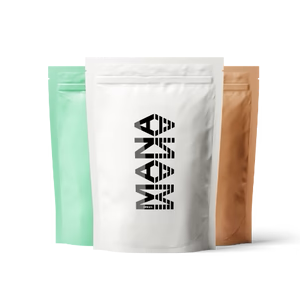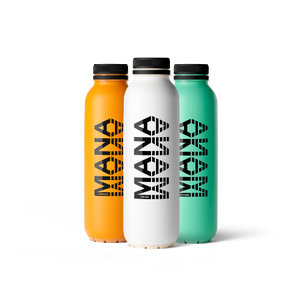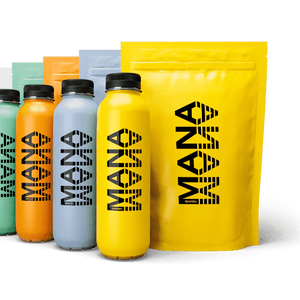blogs
17 june 2022
You Don’t Want Your Food to End up in the Trash?
We Know How You Can Save Money Without Depriving Yourself!

Imagine going to the supermarket, buying three bags of food and then throwing one of them away. Silly, isn't it? However, the statistics show that this is reality. More than one third of the world's food production never makes it to the table—it ends up in the bin. Food waste affects all of us. Sometimes we don't estimate the quantity of ingredients we buy, sometimes we put too big a portion on our plate and don't finish the meal, or we forget about an unopened packet of salad that takes on a life of its own in the fridge. Wondering what happens to the food you throw away and how it affects your wallet? Read our new blog article to find out how to save money without depriving yourself!
Did you know that in the EU we produce about 88 million tonnes of food waste per year? Yet an estimated 805 million people go to bed hungry—that's one in nine people in the world.
Food waste doesn't start in the kitchen
There are many reasons why food is wasted—from spoilage, improper storage or poor quality, to overproduction of specific food products. Losses occur at every step of the supply chain. From production and transportation to storage and handling in the supermarket and finally in our own kitchens, where the most common reasons for waste are over-shopping, improper storage or poor planning and then forgetting to put the food in the fridge.
While the resale value of discarded food is often cited as a primary concern, it is not the only price we are forced to pay. Money is also wasted on growing, processing, storing and disposing of food that is never consumed. In the EU, we lose or throw away almost 4 trillion crowns worth of food every year! That is three times more than the Czech Republic's budget for one year. This equates to around CZK 8 300 per person living in Europe. But it's not just our wallet that is being wasted, but also natural resources such as water, land and energy.
What will be the cost in the future?
The environmental cost of producing all the food that is ultimately thrown away is truly staggering. According to the UN report, the waste of water alone would be equivalent to the annual flow of the entire Volga—Europe's largest river. At the same time, the energy used to produce, harvest, transport and package this (discarded) food produces more than 3.3 billion tonnes of carbon dioxide (CO2).
If we think of this bio-waste as a piece of land, it would be the third largest producer of greenhouse gasses in the world—after the US and China.
Tips on how to save the environment and your money
Although the problem of food waste starts long before it reaches our tables, we can all do our bit to save money and the environment. So, what can you do at home to make sure food isn't wasted so much?
🖊️ Plan ahead.
If you prepare a list of ingredients for a meal ahead of time, you can combine ingredients much more efficiently. Before you add anything to your shopping list, be sure to check your fridge and pantry first so you know what you really need.
🛒 Beware of impulse purchases.
And special discount offers on foods you don't normally eat. Don't shop when you're hungry, because this also affects how much and what food you put in your basket—we all know this feeling, don’t we.
🤏 Buy exact quantities.
Get into the habit of buying only as much fresh fruit and vegetables as you and your household will eat in the next few days. And if there's any left over, you can always process it: can it, dry it or make ice cream—ripe bananas are ideal for this. Just freeze and then blend with a little lemon and cinnamon. Delicious!
🚀 Include Mana in your diet.
It has a long shelf life and contains no artificial preservatives. One of the other great things about Mana, then, is that you can mix your food in exactly the amount you need—without wasting too much.

New
You can prepare ManaPowder in the exact amount and with the calorie value you need. Just mix with water for a tasty, quick and healthy meal.
Buy🤔 Choose wisely.
When you choose your ingredients, engage as many of your senses as possible. The smell and the feel are the best ways to know when the fruit is ripe enough—whether you have to wait a week or if you have to throw it in the bin already the next day...
🍎 Give "ugly" fruits and vegetables a chance.
These are foods that do not meet the usual standards for size, shape or colour. Don't worry, there's nothing wrong with them, they just don't fit the charts.
❄️ "Fresh" is not always "better".
Food processing techniques such as drying, freezing and canning can help extend the shelf life of food. For example, frozen food results in 47% less household waste than fresh food. Frozen fruit and vegetables still retain high levels of nutrients.
💡 Ensure proper storage.
Did you know that proper food storage extends the shelf life of food? However, every ingredient needs a little different care. Fruits and vegetables, for example, like to be stored dry, so it's worth putting them in a box with a napkin to absorb excess moisture from the surroundings. As for bananas, just wrap the stem end in food-safe foil and they'll last much longer! And if you need your fruit to ripen faster, just put it near ripe apples or bananas—they release a plant hormone (ethylene) that helps speed up the ripening process.

You want to save money? Grab Mana and say goodbye to hunger and food waste, too!
Our lifestyle has changed fundamentally in recent decades. We spend more time in front of monitors, so we don't have as much time or energy to carefully plan and prepare meals. In addition, our time to eat is increasingly based on work, rather than the other way around. Finding a suitable alternative is therefore quite a challenge.
Fortunately, we have a solution—with Mana, you have a full-fledged and really tasty meal in minutes that will quickly give you the energy you need. Without wasting food and spending money on something you won't consume.
How Mana helps you minimize waste and save money:
✅ You got 100% assurance that you only pay for what you actually eat
✅ No worrying, planning and throwing away leftovers
✅ You save money—you can buy one serving of Mana from €1,92
How is it possible that with Mana you can save money and keep waste to a minimum? The answer is simple—long shelf life is the key! This is because it increases the likelihood of consuming all your food, thus avoiding wasted resources and the production of pointless waste.
Thanks to premium ingredients, natural antioxidants and quality packaging, ManaDrink has a minimum shelf life of 12 months and ManaPowder even 18 months. In addition, there is no need to store Mana in the refrigerator. However, it's always a good idea to follow the recommended storage method and keep it in a dry and dark place—preferably in an airtight container. That way you can be sure your food won't end up in the bin, but where it belongs—in your stomach.
Not to mention that Mana will give you as much energy and nutrients as a freshly prepared meal made with the finest ingredients. When you do the math, you just can't find that in any other complete meal.
Sources:
[1] Harvard, School of Public Health. Food Waste The Big Picture.
https://www.hsph.harvard.edu/nutritionsource/sustainability/food-waste/
[2] Harvard, School of Public Health. Tackling Food Waste at Home.
https://www.hsph.harvard.edu/nutritionsource/sustainability/food-waste/food-waste-home/
[3] United States of Environmental Protection Agency. Preventing Wasted Food At Home.
https://www.epa.gov/recycle/preventing-wasted-food-home
[4] Food and Agriculture Organization of the United Nations. World hunger falls, but 805 million still chronically undernourished.
https://www.fao.org/africa/news/detail-news/en/c/243912/
[5] Aleksandar Racz, Vanja Vasiljev Marchesi, Ivana Crnković (2018) Economical, Environmental and Ethical Impact of Food Wastage in Hospitality and Other Global Industries.
https://hrcak.srce.hr/file/302956
[6] Evropský parlament, zpravodajství (2017) Plýtvání potravinami v EU aneb proč končí miliony tun jídla v koši.
https://www.europarl.europa.eu/news/cs/headlines/society/20170505STO73528/plytvani-potravinami-v-eu-infografika
[7] Food and Agriculture Organization of the United Nations. Food waste harms climate, water, land and biodiversity – new FAO report.
https://www.fao.org/news/story/en/item/196220/icode/
[8] Feedbackglobal.org. Food system facts.
https://feedbackglobal.org/knowledge-hub/food-waste-scandal/



